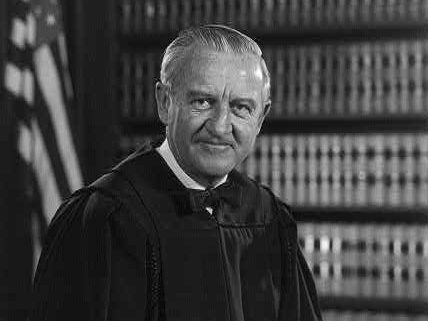Justice John Paul Stevens Is Wrong About the Second Amendment, Again
The retired justice wants to claw back parts of the Bill of Rights.

In his 2008 dissent in District of Columbia v. Heller, Supreme Court Justice John Paul Stevens insisted that the Second Amendment offers zero protection for what he called the "right to possess and use guns for nonmilitary purposes like hunting and personal self-defense."
Writing in today's New York Times, the retired justice reiterates that losing view. "For over 200 years after the adoption of the Second Amendment," Stevens maintains, "it was uniformly understood as not placing any limit on either federal or state authority to enact gun control legislation." To clear the path for sweeping gun control restrictions now, Stevens advises, activists should turn their energies towards passing a "constitutional amendment" that would overturn Heller and "get rid of the Second Amendment."
One problem with Stevens' position is that he is dead wrong about the legal history. His preferred reading of the Second Amendment has never been "uniformly understood."
For example, consider how the Second Amendment was treated in St. George Tucker's 1803 View of the Constitution of the United States, which was the first extended analysis and commentary published about the Constitution. For generations of law students, lawyers, and judges, Tucker's View served as a go-to con-law textbook.
Tucker was a veteran of the Revolutionary War, a colleague of James Madison, and a professor of law at the College of William and Mary. He observed the debates over the ratification of the Constitution and the Bill of Rights as they happened. And he had no doubt that the Second Amendment secured an individual right of the "nonmilitary" type. "This may be considered as the true palladium of liberty," Tucker wrote of the Second Amendment. "The right of self-defense is the first law of nature." In other words, the Heller majority's view of the Second Amendment is as old and venerable as the amendment itself.
Regrettably, today's op-ed is not the only example of Stevens trying to claw back a portion of the Bill of Rights.
Stevens cast a dissent, for instance, in Texas v. Johnson (1989), the landmark case in which the Court ruled that flag-burning is protected by the First Amendment. "Government may not prohibit the expression of an idea simply because society finds the idea itself offensive or disagreeable," declared the majority opinion of Justice William Brennan. Stevens rejected that endorsement of bedrock free speech principles.
Likewise, Stevens has said that had he not retired from the Court in 2010, he would have joined Justice Samuel Alito's dissent in Snyder v. Phelps (2011), the case in which the Court recognized First Amendment protections for the rights of Westboro Baptist Church members to stage offensive protests outside of military funerals. "Such speech cannot be restricted simply because it is upsetting or arouses contempt," declared the majority opinion of Chief Justice John Roberts. Stevens rejected that endorsement of free speech principles too.
And then there is Stevens' record on the Fifth Amendment, as exemplified by his majority opinion in Kelo v. City of New London, which allowed a municipality to wield its eminent domain powers not for a "public use," as the Constitution requires, but for the benefit of a private developer working with the Pfizer corporation. "The Kelo majority opinion remains unpopular," Stevens acknowledged in a 2011 speech at the University of Alabama School of Law. "Recently a commentator named Damon W. Root described the decision as the 'eminent domain debacle.'" (Guilty.) How did Stevens' justify his debacle? He claimed that "Kelo adhered to the doctrine of judicial restraint, which allows state legislatures broad latitude in making economic policy decisions in their respective jurisdictions."
In sum, John Paul Stevens has a bad habit of shortchanging the Bill of Rights for the benefit of overreaching officials and would-be censors. I'd think twice before taking his constitutional advice.


Show Comments (319)